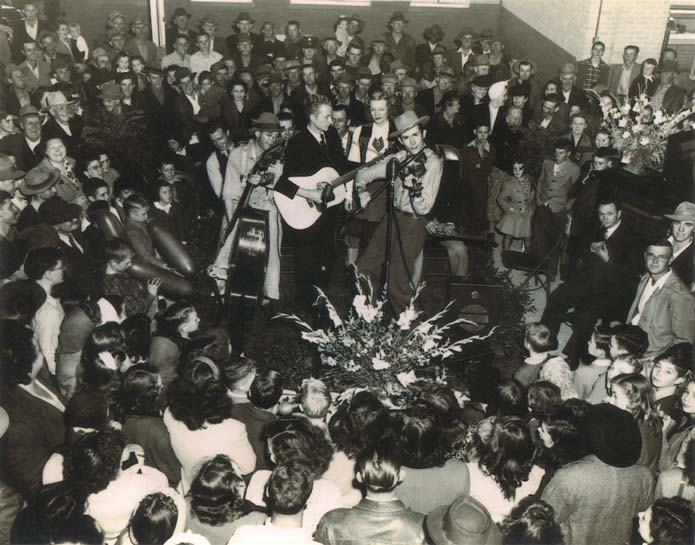Wealth Won't Save Your Soul
May 6, 2012
 In 1946, a 23-year-old singer-songwriter named Hiram Williams, somewhat better known to the world as Hank Williams, performed with his band at the opening of a new Chevrolet dealership in Luverne, Alabama. That's him with the fiddle, an instrument he did not perform on very often.
In 1946, a 23-year-old singer-songwriter named Hiram Williams, somewhat better known to the world as Hank Williams, performed with his band at the opening of a new Chevrolet dealership in Luverne, Alabama. That's him with the fiddle, an instrument he did not perform on very often.
It was either the evening of this show in the Chevy parking lot, or the night of a street dance right around that same time, a fundraising dance sponsored by the Luverne volunteer fire department, when Hank Williams passed out drunk and had to be driven back home to Montgomery, an hour away. The designated driver was Howard Morgan, then captain of the Luverne fire department. "Hank Williams wasn't anything special in those days," Morgan recalled. "Just another cowboy singer."
Chevy dealership openings and volunteer fire department fundraisers were pretty much the only work Williams could get at that time; he'd been fired from his radio show for "habitual drunkenness," and a few months earlier he'd flunked his audition at the Grand Ole Opry. But he'd just made his first recording, which he may or may not have performed in Luverne that day: "Wealth Won't Save Your Soul."
His first record was a dud commercially, but by early 1947, with "Move It On Over," Hank Williams was on fire. During the next six years he wrote and recorded thirty songs, eleven of which made it to number one on the charts. His concerts all over the country drew thousands of adoring fans; never again would he have to perform in a Chevy dealership parking lot in Luverne, Alabama.
His final recording, a few weeks before his death on January 1, 1953, from abuse of alcohol, amphetamines, seconal, chloral hydrate, and morphine: "I'll Never Get Out of This World Alive."
On January 4, 1953, the city of Montgomery, Alabama, saw the largest crowd in its history gather to pay final respects to Hank Williams and to listen to Nashville stars performing his greatest hits. The funeral had to be moved to the city convention hall. Luverne volunteer fire chief Howard Morgan and his family were in Montgomery that day, stuck in traffic as the line of funeral-goers stretched for miles. Our friend Martha Morgan was two years old at the time, sitting in the backseat, too young to understand the occasion but definitely alert to the scene, to the sight of car after car after car after car; Hank Williams's farewell traffic jam became one of Martha's earliest childhood memories.